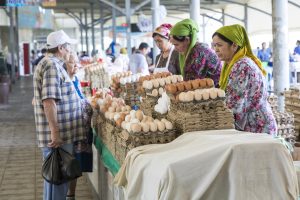Last month, I had the pleasure of visiting Tashkent to hold productive talks with Uzbekistan’s leadership as it continues the implementation of transformative economic and social reforms. During our exchange, we agreed that the strategic partnership between the country and the World Bank will only strengthen in the years to come as the country pursues further measures to end poverty and boost the shared prosperity of its citizens.
At the 2nd Uzbekistan Economic Forum in Samarkand later this week, I am returning to discuss the successive crises battering the world economy and what Uzbekistan can do to better withstand these shocks and build an inclusive market economy.
Uzbekistan has made impressive development gains over the past five years by relentlessly pursuing the path of market-oriented reforms. It will need to sustain momentum to achieve its ambitious goal of reaching upper-middle-income status by 2030. Unfortunately, just as the Europe and Central Asia region* started to recover from the economic damage caused by the COVID-19 pandemic, the war in Ukraine has made the path more difficult.
The World Bank now forecasts that GDP across emerging market and developing economies in Europe and Central Asia region will contract by 0.2 percent in 2022 as soaring commodity prices exacerbate inflationary pressures. The region’s growth next year is predicted to be positive but still very low at 0.3 percent. Moreover, the near-term outlook is subject to several downside risks: high commodity prices, a likely slowdown in China and the EU, higher interest rates, and tightening financing conditions globally. And the future holds many uncertainties, making forecasting challenging.
What is encouraging to see is that Central Asian economies are performing better than the World Bank had predicted in the spring of 2022. We now forecast the average growth rate for Central Asian countries to come in at 3.7 percent in 2022 and 3.9 percent in 2023.
Thanks to continuous market reform efforts since 2017, Uzbekistan has become much more resilient to external shocks. With GDP projected to expand by 5.3 percent in 2022, Uzbekistan will be one of the fastest growing of the Europe and Central Asia region’s 23 countries, along with Armenia, Croatia, Georgia, and Montenegro. And growth is projected at 4.9 percent next year, currently the region’s highest forecasted growth rate.
Uzbekistan has an impressive record of market-oriented reforms. Over the past five years, it has eased foreign exchange and trade restrictions, liberalized prices, and improved the business environment. An overhaul of the tax code has made the budget more transparent and oriented to the needs of vulnerable groups. Inflation targeting and new fiscal rules will help keep consumer prices and public debt in check.
Progress to strengthen social protection systems has been rapid, too. Namely, since January 2020, the government has more than doubled the number of poor households receiving social assistance, helping them to get back on their feet (0.6 million in 2019, 1.2 million in 2021, and nearly 1.8 million beneficiary households by April 2022). The World Bank has supported Uzbekistan in implementing many of these reforms.
In more recent years, the reform agenda’s focus has broadened and deepened with attention to specific sectors. The authorities introduced a new insolvency framework to encourage restructuring of distressed but viable firms, protect capital allocated to productive business and decent jobs and speed up the transition to market principles. In July 2022, a Social Protection Strategy was approved. A new privatization law will help guide what promises to be a transformational program to sell state assets. The Parliament is now considering a landmark competition law, which will be a step-change for ensuring a level playing field for all businesses.
Concerted and sustained momentum on reforms will be needed to meet the government’s ambitious goals of reducing poverty by half by 2026 and reaching upper-middle-income status by 2030. To achieve these targets, Uzbekistan will have to accelerate per capita income growth to at least 9 percent per year. So, what should the country focus on?
There is still more to be done to level the playing field for the private sector and address the risk of vested interests holding back productivity and growth. To raise its international competitiveness, Uzbekistan must further liberalize factor markets (such as land, capital, energy and raw materials, and the labor force) and cut the cost of trade. To address resource misallocation and raise labor productivity, completing the agenda of liberalizing prices, reforming state enterprises, improving financial systems, and strengthening the business environment will be critical.
Improvements in the quality of health and education services are essential, as are further investments in well-planned social safety nets that need to underpin reforms to shield the poor and vulnerable from the costs of transition. Many of these changes are complex and could adversely affect some citizens. Therefore, they require careful preparation and sequencing.
This year we mark 30 years of partnership between Uzbekistan and the World Bank. In celebrating this anniversary, we look forward to supporting the government in continuing to build an inclusive and sustainable market economy focused on enhancing the prosperity and well-being of all citizens. Our financial and analytical support will be delivered through a new Country Partnership Framework for the next five years, contributing to the implementation of the Development Strategy of New Uzbekistan outlining transformative economic and social reforms for 2022-2026.
I look forward to a vibrant and interesting discussion with participants of the Economic Forum in Samarkand and, like last year, exchanging ideas with them on approaches to inclusive, resilient, and sustainable growth in Uzbekistan.
* The World Bank includes the following subregions and countries in the Europe and Central Asia region: Central Europe (Bulgaria, Croatia, Hungary, Poland, and Romania), Western Balkans (Albania, Bosnia and Herzegovina, Kosovo, Montenegro, North Macedonia, and Serbia), Eastern Europe (Belarus, Moldova, and Ukraine), South Caucasus (Armenia, Azerbaijan, and Georgia), Central Asia (Kazakhstan, the Kyrgyz Republic, Tajikistan, Turkmenistan, and Uzbekistan), Russian Federation, and Turkey.

































